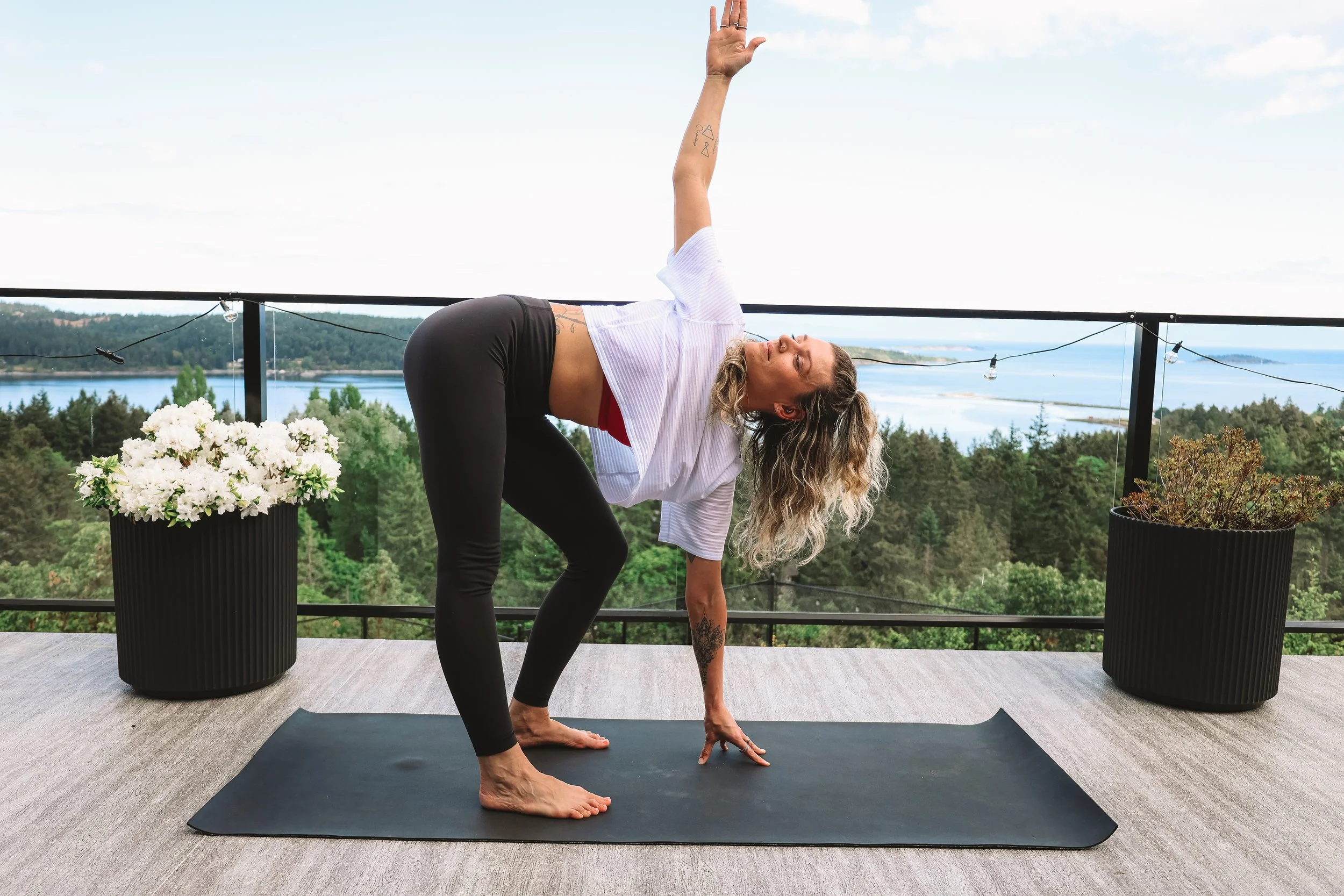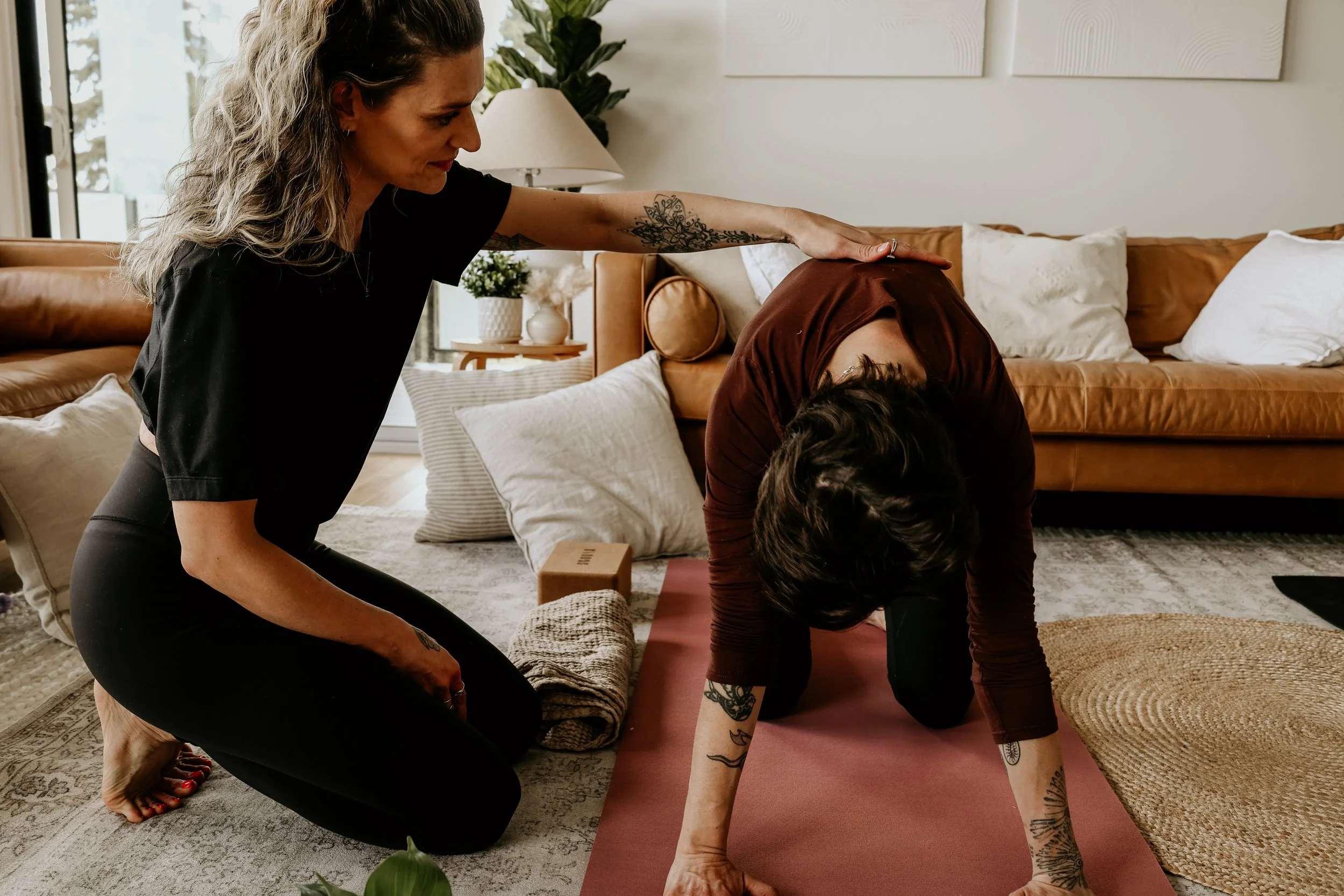
Why Yoga Therapy?
Many people who try yoga therapy feel as though they have already exhausted other resources. They have tried other modalities, but found they didn't encompass the whole person. Maybe you’ve tried therapy and it has only addressed your state of mind. Maybe you’ve tried massage, physiotherapy, and chiropractic services, and found they’ve only attended to the physical.
If you’ve tried the traditional methods and still feel like something’s missing,
you’re not alone.
It’s not about stretching or fitness. And it’s not about fixing you, because you’re not broken. It’s about reconnecting with yourself. Your body, mind, and everything in between.
Unlike traditional yoga classes that are teacher-led and built for the group, yoga therapy is completely client-led.
You set the pace. You define the goals. I’m here to listen, guide, and offer tools that support your whole self. Using the framework of the koshas - the 5 layers of self - we explore and address imbalances across the physical, energetic, mental-emotional, wisdom, and bliss bodies to support integration and harmony.
Yoga therapy offers a different path.
Whether you’re navigating addiction recovery, living with PTSD, or simply looking for a way to feel at home in your own body, this work meets you exactly where you are.
It’s about building nervous system resilience, reconnecting to your body, and learning how to sit with discomfort, without being consumed by it.
Yoga therapy isn’t a quick fix.
There are no gimmicks, no guru vibes. This is a supportive process that offers practical tools and steady routines to create meaningful, lasting change. This practice meets you exactly where you are, but asks you to show up, engage, and commit. Change doesn’t happen all at once but when you are ready to show up for yourself (even just a little at a time), the shift begins.
If you’re ready to try something different, something that treats you as a whole person, I’d love to connect.
Book a free consultation to see if this path feels right for you.
FAQs
-
The International Association of Yoga Therapists defines yoga therapy as “The professional application of the principles of yoga to promote health and well-being within a therapeutic relationship that includes personalized assessment, goal setting, lifestyle management, and yoga practices for individuals or small groups."
Yoga therapy is a personalized and holistic approach, tailored to your unique goals and challenges. The practices are specifically adapted to your body, nervous system, and life experience. Sessions are client-led and communication between client and practitioner is ongoing during the sessions. Yoga therapists also receive advanced training in anatomy, mental health, and mind-body integration.
In a typical yoga class, the sequence has been set for the group and is often focused on fitness or generalized well-being. While some classes can be therapeutic, there is little to no communication between group participants and teacher.
-
Your initial session will include a thorough intake and consultation so I can better understand your story, intentions, and needs. Depending on the nature of your visit, a physical assessment may be done to understand how your body moves and where you may be holding tension or discomfort. We will discuss your goals for yoga therapy.
From there, you will be guided through practices tailored specifically to your needs, which may include:
Pranayama (breathwork)
Asana (physical postures)
Guided meditation
Somatic awareness & self-inquiry
Journaling prompts
Suggestions for at-home integration
In follow-up sessions, we will build on your previous session(s), refining or adapting to how you are feeling that day. Follow-up sessions will always be flexible, whether they focus on your over-all long term goals or zoom in on a specific issue or feeling that is present in the moment.
Each session is a collaboration. You are the expert in your experience - my role is to hold space, offer guidance, and help you attune to your body, breath, and inner knowing.
-
Yoga therapy supports a wide range of concerns! These include addiction recovery, PTSD, anxiety, sleep disorders, general physical or emotional tension, and more!
-
Absolutely not! There are no flexibility, strength, or previous experience required. Simply a willingness to explore. All sessions will be adapted to meet you where you are.
-
Wear anything that feels comfortable that will allow you to move and breathe with ease! I would recommend bringing a journal and some water or tea.
For in-person appointments, all props will be provided.
If you are doing an online appointment, do your best to find a quiet, distraction free space. If you have blocks and bolsters at home, great! If not, many other items can be used for props (pillows, blankets, towels, etc.)
-
No. Yoga therapy is a complementary practice, not a replacement for medical or psychological care. I do not diagnose or treat. If you are working with other providers, yoga therapy can be a supportive part of your overall care plan.







